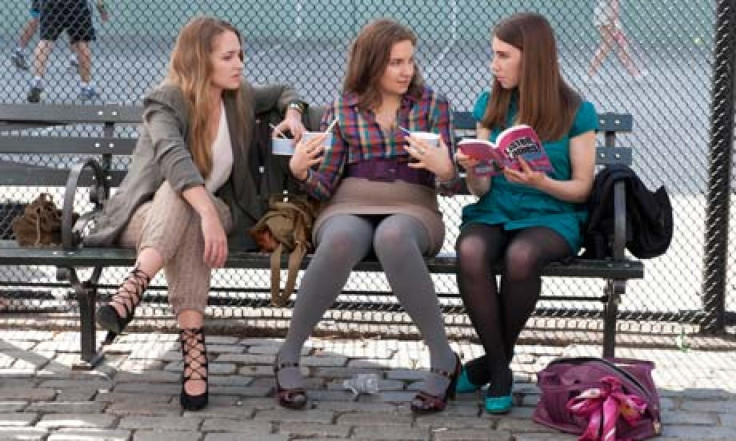Lena Dunham Feels ‘Heartbreak’ Over ‘Girls’ Criticism, Promises More Minority Characters

Actress, writer and director Lena Dunham told Fortune magazine's Most Powerful Women Summit on Tuesday that the second season of “Girls” will feature a more diverse cast.
According to Reuters, the 26-year-old Dunham feels "heartbreak at the idea that the show would make anyone feel isolated."
She also said the second season will include "a multitude of new characters in the show. There are some of color. Some are not. Some are Caucasian,” she said.
"All I want to do is make women feel excited and included by the show," she added of the Brooklyn-set series.
When "Girls" premiered in April, Dunham, who created and stars in the HBO hit, was criticized for featuring an all-white cast.
Countless blog posts, tweets, and news stories called the show out for illustrating the so-called plight of four relatively privileged white women in their 20s.
“The entire show takes place in New York City and, yet, they really don’t have much diversity, if any diversity on the show,” said CNN reporter Soledad O’Brien in a segment about the series.
James Franco also found the monochromatic picture off-putting. The famed multitasker griped about the series in his blog at the Huffington Post.
“Many people -- especially non-white women -- have said they feel unrepresented by the show, whose lead characters are all white,” said Franco.
The actor noted that “Girls” does not accurately depict New York’s multicultural population.
“Because TV is such a popular medium, HBO has a responsibility to represent its subjects accurately, especially when the network is selling a show as a representation of young New York,” he said.
In May, Dunham appeared on NPR’s “Fresh Air” and addressed the criticism.
"I wrote the first season primarily by myself, and I co-wrote a few episodes. But I am a half-Jew, half-WASP, and I wrote two Jews and two WASPs. Something I wanted to avoid was tokenism in casting,” she said. “If I had one of the four girls, if, for example, she was African-American, I feel like — not that the experience of an African-American girl and a white girl are drastically different, but there has to be specificity to that experience [that] I wasn't able to speak to. I really wrote the show from a gut-level place, and each character was a piece of me or based on someone close to me. And only later did I realize that it was four white girls.”
But her defense did little to quell the criticism.
Some, like Jezebel’s Cassie Murdoch, didn’t buy Dunham’s excuse.
“OK, but this argument only takes you so far, since there are plenty of other major characters — like men, for instance — which she clearly hasn't lived as, yet she still managed to include them in the show,” said Murdoch. “As for the four main characters, if they're really just strands of Dunham herself, then maybe it just would have been better to call the show ‘Girl’ instead of ‘Girls,’ which implies they were aiming for something a bit broader.”
Several TV critics have pointed out that, in an industry that seldom represents ethnic minorities, “Girls” has been unfairly targeted.
In “TV’s Diversity Dilemma,” Entertainment Weekly’s Mark Harris pointed out that “Girls” is one of many shows with a predominantly white cast.
“’Girls’ feels like an odd target for that complaint: Why not, for example, ‘Game of Thrones,’” said Harris, "where, except for the random dude on horseback, ‘swarthy’ is about as ethnic as things get? I assume that extensive historical research has shown that very few people of color resided in Fake Magical Dragonia (or, apparently, in the neighboring fantasylands of 'Grimm,' 'American Horror Story' and 'Once Upon a Time').”
In the New York Times piece “Broadcasting a World of Whiteness,” Jon Caramanica pointed out that in TV there’s little diversity either in front of and or behind the camera.
“Television is nowhere near diverse enough — not in its actors, its writers or its showrunners. The problems identified by critics of ‘Girls’ are systemic,” said Caramanica, traceable to network executives who greenlight shows and shoot down plenty of others. "It’s at that level that diversity stands or falls.”
“Girls” is example of a major issue in the entertainment industry. In a 2008 report issued by the Screen Actors Guild, it was revealed that 72.5 percent of U.S. television, film and theater roles went to Caucasian actors — down from 81 percent percent in 2002. In 2011, The Wrap reported that several civil rights groups came down on NBC for failing to produce more shows that depict minority groups.
Artists like Dunham have enough influence to address the underrepresentation of minorities on TV. “Girls” has opened up a dialogue about an issue that isn’t discussed often. And, based on the star’s statements, she is working to change “Girls” in ways that few show creators have.
The actress told NPR that she would be incorporating “actors of color” into the show’s second season.
“I’m really excited to introduce new characters into the world of the show,” she said. “Some of them are great actors of color.”
Based on the “Girls” season two casting notice that was featured in Backstage at the time, Dunham stayed true to her word. The casting notice called for “all types” - including those of African-American, Latino and Asian descent.
Furthermore, as the Huffington Post notes, African-American actor and “Community” star Donald Glover will appear in the show’s second season.
The effectiveness of Dunham’s new approach to the series won’t be clear until January, when the second season premieres on HBO.
© Copyright IBTimes 2024. All rights reserved.











